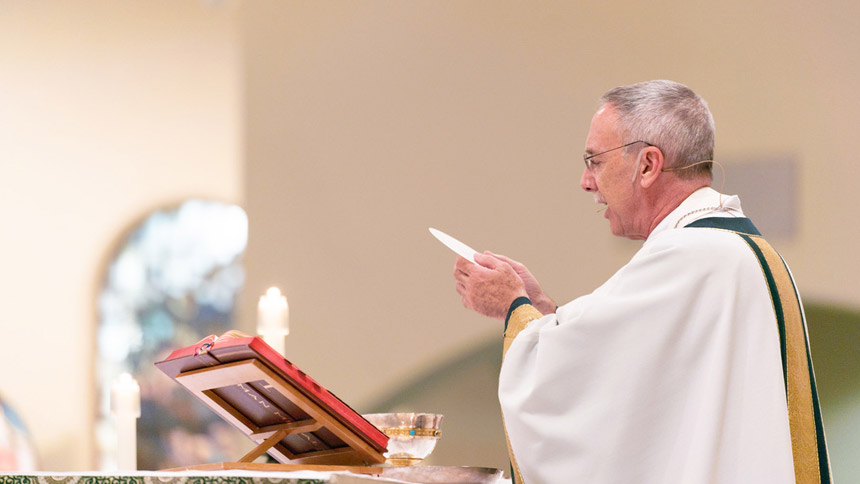
Reflecting back to when my brother bishops and I were determining whether to issue a teaching document on the beauty and power of the Eucharist, we heard different opinions about who should receive or who should be denied receiving Jesus in the sacrament of the Eucharist.
This makes me ponder how and why we have we reached this point.
I am reminded of when John the Baptist was with two of his disciples. Noticing Jesus passing by, he said, “Behold, the Lamb of God.” Andrew was one of the two who had heard John and followed Jesus. He found his brother Simon and told him, “We have found the Messiah” and took him to Jesus. (Jn 1: 35-42)
I believe that for many years, we, the Church, have failed in the formation of our people.
Catechesis – the basic instruction in the deposit of faith – has become one more class, a set of rules or requirements to receive the sacraments. We have focused on information but not formation. The results are clear and sad: after receiving the sacrament of confirmation, many of our young people disappear from the Church.
The current catechetical instructions speak of "Eucharistic celebration," of “going to Mass," and of receiving "Communion." For many, these terms are only words added to one’s vocabulary without really understanding the great significance of their meaning. These words don’t help them discover whom they celebrate. What’s the use in learning and memorizing these terms if they don’t help one discover the person of Jesus in the risen Christ?
This type of “academic” catechesis seeks to inform but does not prepare the person for an encounter with Christ. It doesn’t lead one to want to develop a true friendship with Jesus, to know that he is seeking us always, hoping and waiting for us to receive him.
This is our collective fault. We have forgotten that faith formation is primarily teaching to seek Christ, to find Christ, to know Christ, and to love Christ. Thus, a very high number of even Catholics who attend Mass do not believe in the real presence of Jesus in the Eucharist. They don't believe in what we celebrate because they don't know whom we celebrate! If we do not recognize the transformation of the Eucharist, the Real Presence, then it is even more difficult for us to receive the life-transforming consequence of the Eucharist, to become more Christ-like in our own lives.
Before casting a condemning stone to those around us, we first must examine our own conscience and acknowledge that we have failed to impart a proper faith formation when we only offered “academic” religious instruction. We must approach our own failings with humility, understanding that we will lead more people to Jesus when we follow his own example.
A heart rooted in love acquires a well-formed conscience that distinguishes truth and realizes that what may be legally possible is not necessarily morally licit. But the conversion of one’s heart cannot be forced; it can only take place with empathy and love.
The encounter with the person of Jesus leads one to inquire – to learn more, to get to know him better, to become eager to follow him. Followers become faithful to a person – this divine person who is love itself – not to a book or document. To believe is the fruit of love!
Love of God is not only to be understood; it is to be lived! This is the key to catechetical formation: helping our people to prepare for their own personal encounter with Jesus, present in and through the sacraments. The encounter with God’s love is an encounter with he who is love and life itself: it is to truly live! I repeat, love is to be lived; the same goes with Jesus in the sacraments – we live the sacraments!
Sharing this experience is up to all of us. The best classrooms and the best training materials are from good disciples of Jesus, "Andrews,” who, by their own example, point others towards the encounter with Jesus – with love – for all to see.
We must do everything possible to enable our people to live and experience the beautiful mystery we celebrate. This formation towards an encounter with Jesus is essential for our people because that encounter awakens the heart first and then the intellect. Only then is one able to experience the living Jesus and the risen Christ. Thus, transformed by his love, living his Eucharistic presence, our lives will become a reflection of him who we celebrate, and we’ll joyfully preach of the sanctity of life and of respect for his creation.

